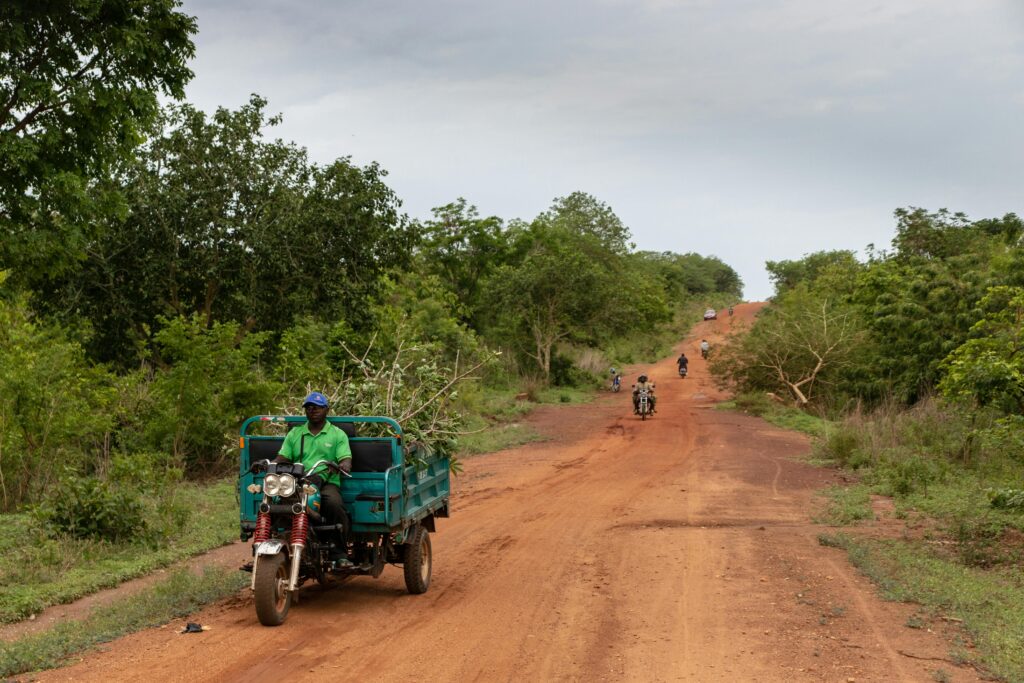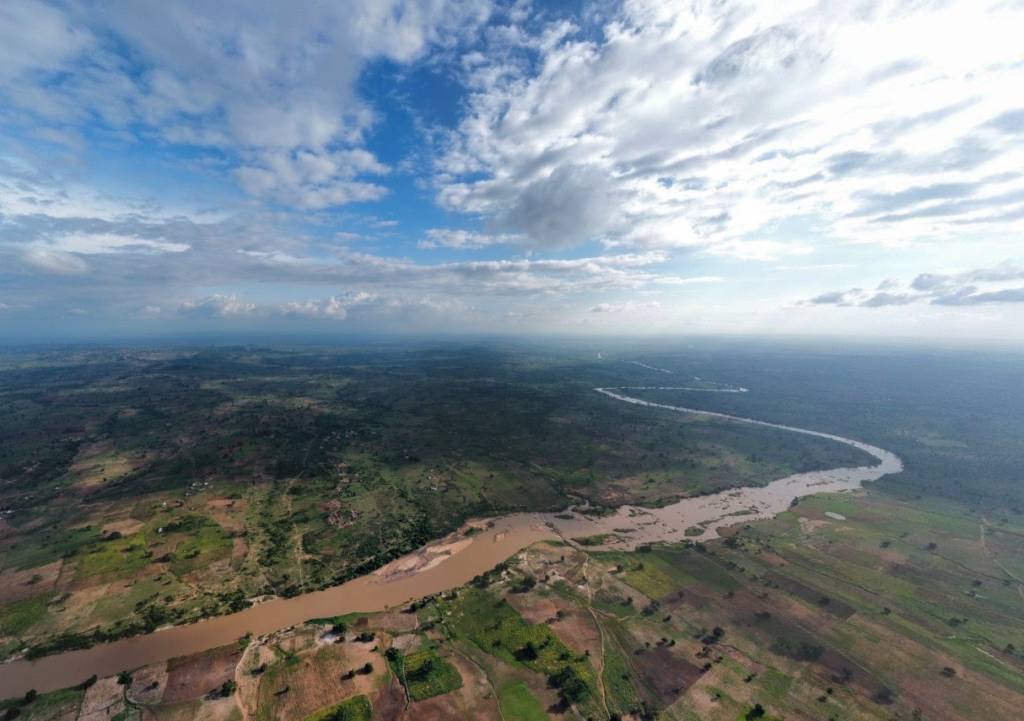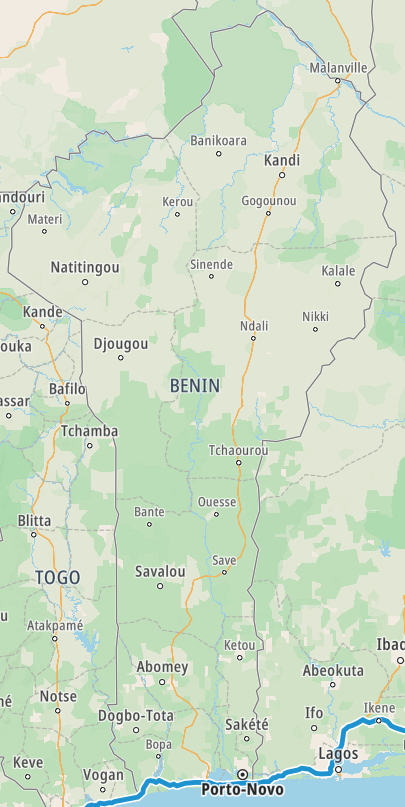Benin / République du Bénin – Let’s explore here

What’s it like in Benin?
Benin is a small, tropical, agricultural country in west Africa. The terrain consists mostly of forest and savanna, with low mountains in the north west, and most of its population lives by its short coast. The coastline is 75 miles (121 km) wide, and the highest point is Mont Sokbaro, in the west of the country, at 2,159 ft (658 m) above sea level.
It has a very long, rich and troubled history. It shares land borders with Togo, Nigeria, Niger and Burkina Faso.
The population of Benin is around 14 million (2023), about 265,000 of whom live in the capital, Porto-Novo.

A bit about the history of Benin
Early History and the Kingdom of Benin
The history of Benin dates back over a thousand years. The Kingdom of Benin, located in present day southern Nigeria, developed around the 11th century. Initially, it was a small city state, which gradually expanded into a powerful kingdom. Benin was known for its advanced governance, military strength, and impressive art, particularly its famous bronze plaques.
The Benin Empire
By the 15th century, the Kingdom of Benin had become a prominent empire. Under the leadership of the Oba (king), Benin established trade relationships with European powers, including the Portuguese. The Benin Empire was renowned for its well organised military and its efficient administration. The kingdom’s wealth largely came from trade in ivory, palm oil and slaves.
European Contact and Decline
In the 19th century, the British expanded their influence in West Africa. Tensions between the British and Benin led to the British expedition to Benin in 1897, which resulted in the fall of the Benin Kingdom. The British looted and destroyed the city, taking many of its priceless bronzes and artefacts. The kingdom was subsequently annexed and became part of British-controlled Nigeria.
Colonial Period and Independence
Benin became a part of British Nigeria during the colonial period. The region underwent significant changes, including the introduction of Western education, infrastructure and new administrative structures. Nigeria gained independence from Britain in 1960, and Benin became part of the newly formed nation.
Modern Benin
After Nigeria’s independence, Benin, like many parts of the country, faced political instability. In 1991, the country formally changed its name from the People’s Republic of Benin to the Republic of Benin, marking a shift towards a more democratic government. Since then, Benin has made strides towards political stability, with multi party elections and an increasingly active role in regional and international affairs.

Benin road trip
Our Beninese road trip is part of a much larger African road trip.
Map of our road trip through Benin

Our current planned road trip takes us from Togo along the coast towards the capital, Porto-Novo, before moving on to Nigeria.
No doubt we’ll explore the country much more than this continent-spanning short route shows, in particular checking out the capital and inland Benin.
Hopefully our journey will improve our knowledge of this intriguing and beautiful country, and enable us to meet some interesting people. We’ll be updating this page at that time – don’t forget to check back 🙂
What’s it like to drive in Benin?
They drive on the right hand side of the road in Benin. In the main, roads are very poor, with many being unsurfaced dirt tracks. Driving standards are also poor.
Do you require an international driving permit in Benin?
We’ve created a dedicated page to driving abroad, which answers this question, and more, which you might find helpful.
Can you use your UK driving license when driving through Benin?
We’ve created a dedicated page to driving abroad, which answers this question, and more, which you might find helpful.
Do I need a carnet de passages to drive in Benin?
We’ve created a dedicated page to driving abroad, which answers this question, and more, which you might find helpful.
What is the weather like in Benin?
The rainy season in Benin is from March to October. The dry season is from November to February. The best time to visit is between November and January. The worst months are May to September.
What currency do they use in Benin?
In Benin they use the West African CFA franc. Cash is widely used. The use of credit / debit cards is not widely accepted. Travellers cheques are not readily accepted. There are very few ATMs in cities and towns throughout the country.
The West African CFA franc is used in Benin, Burkina Faso, Guinea-Bissau, Côte d’Ivoire, Mali, Niger, Senegal and Togo.
You should make yourself aware of the amount that your bank charges you for using credit and debit cards abroad. Often credit cards are cheaper for purchasing items directly, and for withdrawing cash from ATMs.
What language do they speak in Benin?
They speak French in Benin, although only about a third of the population speak it. For is spoken by another quarter of its citizens. English is becoming more widely spoken, particularly along the border with Nigeria, and amongst the younger generations.
What time zone is Benin in?
Remember, when you’re planning your next trip to take a look at what time zone it’s in.
Do I need a visa to visit Benin?
We’ve created a dedicated, more comprehensive page on visas, which you should find helpful. Check it out!
Is wild camping legal in Benin?
Yes, wild camping is fine in Benin.
What plug / socket type do they use in Benin?

In Benin they use plug / socket type E.
Health issues in Benin
Is it safe to drink water in Benin?
No, it is not safe to drink tap water in Benin. Bottled water is readily available throughout the country.
What vaccinations are required for Benin?
This NHS website is kept up to date with all relevant information on vaccinations in Benin.
Phones in Benin
What is the country calling code for Benin?
The country calling code for Benin is +229
What are the emergency phone numbers in Benin?
- The emergency number for police in Benin is: 117
- In Benin, the emergency number for ambulance is: 112
- The emergency number for fire in Benin is: 118
If you’ve got some useful info that you’d like to share, let us know!
And don’t forget to check out all the other pictures!
